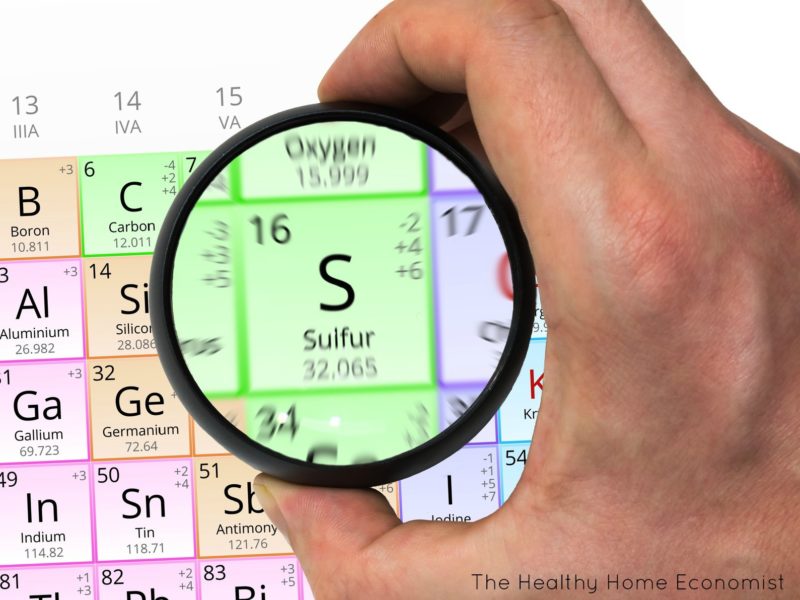
How sulfur deficiency may contribute to the inability to raise Vitamin D levels and chronic diseases like dementia. Where to get this critical nutrient naturally in whole foods to help support natural detoxification via the body’s elimination pathways.
A neighbor of mine who is in his 70’s, looks 50, and still does triathlons once told me that his mother used to make him drink well water. He hated it because it stunk to high heaven of rotten eggs! That rotten egg smell is, of course, hard water with high amounts of sulfur in it. She told him that it would boost his immune system and keep him healthy.
Smart lady.
Unfortunately, sulfur, also spelled sulphur, is all but forgotten as a critical nutrient in recent decades. Yet, this important element is very necessary for the maintenance of health. Moreover, it is important for the prevention of debilitating illnesses such as Metabolic Syndrome and perhaps Alzheimer’s.
Shockingly, a Minimum Daily Requirement (MDR) to avoid sulfur deficiency does not even exist! This despite the fact that this mineral is the eighth most common element by mass in the human body.
Countries With High Sulfur Intake Are Some of the Healthiest
The countries of Greece, Italy, and Japan are the primary suppliers of sulphur to the rest of the world. Isn’t it coincidental that these same countries enjoy some of the lowest rates of heart disease and obesity on the planet?
Perhaps not. Icelanders’ remarkably low rates of depression, obesity, diabetes, and heart disease can possibly be attributed to the country’s distinctive line of volcanoes. Periodic eruptions blanket the soil with sulphur containing volcanic rock. This enriched soil is of tremendous benefit to any plants grown or animals grazing there. In turn, people who use these plants and livestock for food enjoy greatly enhanced health.
It was once thought that the Icelandic diet was so protective against chronic illness due to a high intake of fish. This theory does not hold up, however, as Icelanders who move to Canada and continue eating a lot of fish do not continue to enjoy the same low rates of disease.
It seems that the Icelandic soil which is unusually rich in sulphur may indeed play a pivotal role in the health and avoidance of sulfur deficiency of its residents.
Sulphur’s Critical Role in the Body
Sulphur is critical to many of the body’s biological processes, metabolism included.
Without adequate sulphur, glucose metabolism becomes defective. This leads to muscle and fat cell damage as the result of becoming glucose intolerant. Over time, sulphur deficiency can lead to all manner of skeletal and muscle disorders with corresponding pain and inflammation.
This impaired glucose metabolism resulting from insufficient sulphur is also implicated as a factor in obesity and the dangerous condition known as Metabolic Syndrome. This occurs because one way the body compensates for defective glucose metabolism is by gaining weight.
When sulphur deficiency occurs within the context of a lowfat diet, the problem becomes more serious. Additional sources of glucose present in a lowfat diet in the form of carbohydrates are converted to fat. Worse, these lipids are released into the bloodstream as triglycerides to fuel damaged and inflamed muscle cells.
Alzheimer’s Disease Partly Due to Sulfur Deficiency?
Analysis of the minerals present in the cells of the typical Alzheimer’s patient reveals that sulphur is almost nonexistent compared with a normal profile.
Some research has indicated that the reversal of a serious sulphur deficiency state can prevent or halt the progression of this disease. In addition, it may potentially reverse it provided the patient is still in the early stages where little brain damage has occurred. Coconut oil for Alzheimer’s has shown promise as well.
Could the skyrocketing cases of Alzheimer’s in recent years be related to the shunning of eggs by older Americans? Eggs are an excellent source of sulfur! Yet, in adult living facilities and nursing homes, egg replacements like Egg Beaters are commonly used instead.
Sulphur Helps Mobilize Vitamin D from the Sun
When UVB rays from sunlight hit unprotected skin, they trigger a chemical reaction that converts cholesterol into vitamin D3.
Vitamin D3 is then bound to a sulfate group, forming vitamin D3 sulfate, which is soluble in water.
This water-soluble form allows vitamin D3 to be transported more easily through the bloodstream to various tissues and organs, where it can perform its essential functions, such as regulating calcium levels, supporting immune function, and maintaining bone health.
While vitamin D is fat-soluble, vitamin D3 sulfate is a form of the vitamin that is actually water-soluble. This allows it to travel freely in the blood throughout the body.
On a side note, the vitamin D3 in supplements is not the same vitamin D3 as what you get from the sun and should not be considered an adequate substitute. Except in cases of extreme deficiency, research suggests that these supplements are not helpful and can actually be harmful!
Sunlight exposed skin also produces large amounts of cholesterol sulfate, providing cholesterol levels are sufficient for this to happen.
Could undiagnosed sulfur deficiency and/or insufficient natural cholesterol in the diet be contributing to the epidemic of undiagnosed Vitamin D deficiency?

Make Sure You Get Enough to Avoid Sulphur Deficiency!
It is quite shocking that sulfur is basically ignored in nutritional circles. Nonetheless, it is a critical nutrient and one that is necessary for vibrant health and prevention of chronic disease.
One very simple way to improve the body’s sulfur status quickly is through regular Epsom salt baths. 2-3 per week soaking for 20 minutes is a sensible regimen. Epsom salt is comprised of magnesium sulfate, and both magnesium and sulfur absorb readily into the body via the skin. One caveat: Be sure to buy USP certified Epsom salts. Avoid lower quality agricultural grades.
With regard to dietary sources, another excellent way to ensure you get enough is to eat more eggs! The incredible edible egg contains high amounts of natural sulfur. Eggs also supply natural cholesterol to ensure enough is available to mobilize sulfur combined with Vitamin D in the blood. Other foods high in this element include onions, garlic, and cabbage.
Do not rely on dried fruit treated with sulfur dioxide. This is not a healthy source of sulfur!
Another caveat to note is that while certain plant foods should contain lots of sulphur, it is likely the amounts are low. Why? Sulfur rich produce is dependent upon cultivation in sulfur-rich soil.
Most soils today are depleted of this critical nutrient (unless of volcanic origin or organically treated with azomite volcanic rock dust). Thus, unless you are sure about where your vegetables are grown, relying on eggs for adequate sulfur in the diet is the decidedly better way to go!
Reference
A Possible Contributing Factor in Obesity, Heart Disease, Alzheimer’s and Chronic Fatigue







Love my garlic, onions, lacto-fermented foods and eggs from my sweet chickens!
We do plenty of eggs and epsom salt
Great info. We are so glad to be getting local eggs, YUM and full of sulfur!
thehealthyhomeeconomist how often do you take epson salt baths? Or how often do you recommend?
I thought Epson salt was loaded with magnesium?
thehealthyhomeeconomist, what are your thoughts on MSM?
Sulfur, Sulfites, and Sulfate, Allergy are not Sulfa Allergies
The words may sound alike but this doesn’t mean they are the same nor that there are cross-reactivities to allergens. Below is a brief description of distinctions.
Sulfur is a chemical compound found in drugs and cosmeceuticals and preservatives. It is not the same as sulfa drug allergy.
Sulfites are preservatives. Some people experience respiratory problems when eating food with sulfites, bisulfites, or metabisulfites. Some wine headaches are from sulfites in red wines. Check labels if allergic.
Sulfates are salts. They are used in some drug compounds. This is not the same as sulfa drug allergy although one can be allergic to sulfates.
Read more at Suite101: What is a Real Sulfa Drug Allergic Reaction? | Suite101
Follow us: @suite101 on Twitter | Suite101 on Facebook
Tonya Scarborough – Thanks for the link to that salt!
I have a farmer friend who grows garlic. She said that back during one of the plagues, the prisoners who had been fed garlic (because the general public didn’t want it(?) or it was cheap or something) were the ones who were able to do clean up and bury the bodies without being infected.
Indian black salt. http://www.saltworks.us/kala-namak-black-salt.html